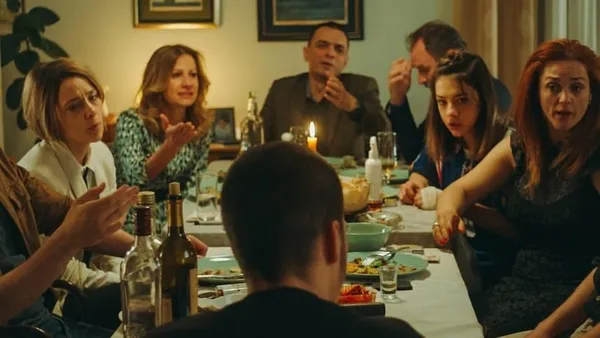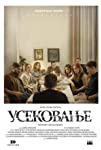Eye For Film >> Movies >> The Beheading Of John The Baptist (2022) Film Review
The Beheading Of John The Baptist
Reviewed by: Nikola Jovic

We could get all lyrical about the family values in regards to any Orthodox Saint Patron's Day (the celebration of the family patron saint), but one thing that is unmistakably a must, a real tradition of the festivity — is overcoming the challenges of being a great host. The kind of host that is willing to go above and beyond for his guests, making sure that every one of them is not only “not-hungry”, but is thoroughly stuffed until they can barely take care of their faculties. A friendly schadenfreude, if you will.
In a similar vein this two-hour, UFO, amphetamine, generation-gap, comedic feast of a film, set against the backdrop of peak Covid, could at times be challenging to handle for some, but for most Saint Patron’s enjoyers, the film’s authors just proved themselves as worthy hosts. Whether it’s by stuffing us with as many jokes and gags as one could fit in between beats of serious drama, or by exploring how ideological shifts in Serbian society impact the family dynamic through different generations under the same roof — The Beheading Of St John The Baptist proves to be an exuberant buffet with plenty of treats for all to enjoy.

Siniša Cvetić’s debut feature, hits the distribution circuit in Serbian cinemas after having won the award for best director and the audience accolade at last year’s Moscow Film Festival, as well as the award for best cinematography for the films DP, Marko Milovanović, at the Pictures in Motion festival in Serbia's Novi Sad.
The film opens with a webcam recording of Jovan (Pavle Mensur), the youngest family member whose bleak outlook is evident as he throws a disenchanted soliloquy at the camera about his latest two-day amphetamine binge, and the importance that stems from it, wishing for a meteor to strike the Earth down. And all in the dawn of his family's celebration of St. John the Baptist, with whom he shares the same name. Despite the strict social distancing measures and enforced curfew at twilight, Jovan’s family is celebrating their Patron Saint as it’s one of the rare occasions when they can catch up with their close relatives and friends, even in the pre-pandemic circumstances. But as the preparations for this event, in celebration of faith, are in order, we’ll witness a complete breakdown of their beliefs. Whether it’s Jovan’s mother Mila (Aleksandra Blamazović), yielding to the fact that her marriage is all but over, looking to cash out on her looks before the age catches up to her, or Jovan’s bother Dušan (Marko Grabež) and his wife Iva (Jovana Gavrilović) dealing with an unwanted pregnancy — all of them are looking for a way to crawl out of their skin, not wanting to address their problems.
As briefly touched upon earlier, Saint Patron’s day — also known as Slava in Serbian; is a religious tradition and a family holiday within the eastern Orthodoxy wherein every year a family celebrates the day of their patron saint. And although the very foundation of the holiday are family values and prayer, what Slava’s are mostly known for are uncomfortably heated (and mostly political) discussions around the dinner table, binge eating, and drinking no end. So in a lot of ways, Saint Patron’s day boils down to proving oneself a worthy man-of-the-house in the eyes of your family and friends, as well as in your own eyes and even in the eyes of God. And is there a bigger way of proving one's faith and hospitality than secretly organising a holiday celebration during peak-Covid curfew social distancing measures? An action one could easily call selfish or inconsiderate in the pandemic times, but what it actually shows, more than anything else, is how the economy of over-enjoyment impacts our relations. Because in the times when you can’t control when and where you can move, or derive pleasure and satisfaction from most things in life, the biggest indulgence might be managing and dozing your own pleasure. Like Jovan points out, everyone is, in a way, high on something.
Whether it’s Mila reminding herself in the mirror that she’s beautiful, wanting to preserve her young age through plastic surgery, or Jovan’s father Bane (Bojan Žirović) clinging to his one and only instance of any tangible success via a framed blown-up check he won in a popular tv trivia quiz, everyone here is on the lookout for some sort of personal validation while they’re all desperately clinging onto the old values, afraid of what might the future bring. This isn’t a typical generation gap within one roof, but a testament to the systemic disenfranchisement within Serbian society where — although all family members are separated by no more than 70 years — all of them grew up in a different country, while never having to leave their neighborhood.
Ideological confusion might be best represented by the iconic symbols every resident keeps on their walls. Everything from a Zidane jersey, Trainspotting (1996) wallpaper and a UFO religious group poster, to before mentioned quiz check, all the way to the actual icon of Saint John the Baptist. In a way, this household is like a Venn diagram of all the values at play within Serbian society, each pulling in their own direction while they’re all participating in someone else’s fantasy.
Having already dealt with the questions of systemic disenfranchisement, proving oneself, drug use, and impotency (both literal and symbolic) in their previous short films, these themes aren't new to the creative duo of Cvetić and Jakovljević. In a way, their first feature outing seems like a distillate of all of their previous efforts in a longer form, with slight evocations and leanings on the tradition of Serbian family chamber-comedies. What sets The Beheading Of St John apart from a myriad of those, is that it has a higher awareness of the political backdrop against which the lives of the film's protagonists are set. Furthermore, the film isn’t obsessed with playing it safe. Whether we’re talking about elaborate setups of poop jokes, or weird character tics and antics, or simply just questionable character choices, this film isn’t afraid to go for it in full swing.
Since the film is set in single-location interiors, it’s primarily dependent on the performances of its ensemble cast, and luckily, that might just be its strongest aspect. Mensur and Ognjanović, in their respective roles of Jovan and Ana, easily carry the film with small performative gestures that are mines of subtlety, supported by an all-around great cast that easily embody the small quirks of the all-recognisable Patron Saint guests and relatives.
The film’s zoom-ins, and whip-pans, contrasted with overheld longshots, are not only stylistically fresh when compared to before mentioned vapid, hammy and stagey family comedies, but are also way more contemporary in their approach. This not only makes the film feel fresh and youthful, but opens the space for spontaneity in the actors' performances. The spontaneity of performances called for mostly natural lighting sources, and a reactive approach to shot composition, which is why Milovanović’s efforts to keep the presentation stylised are noteworthy. Aside from those incremental flourishes, the film’s comedically timed musical motifs, and chapter headings such as: “Where is Zidane?”, and “The Universe is a Cesspit”, timed by the film’s editor Tihomir Dukić, add to the overall playful feeling. What might be weighing it down slightly is that at times, it feels too crowded, while in other instances it shortcuts and deprives us of moments we’ve been waiting for the whole time. But like with all celebrations, the best treats are always in short supply.
Reviewed on: 16 Feb 2023
















